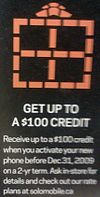
Bell Mobility Inc. is a Canadian wireless network operator and the division of Bell Canada which offers wireless services across Canada. It operates networks using LTE and HSPA+ on its mainstream networks. Bell Mobility is the third-largest wireless carrier in Canada, with 10.1 million subscribers as of Q3 2020.

AT&T Mobility, LLC, also known as AT&T Wireless and marketed as simply AT&T, is an American telecommunications company. It is a wholly owned subsidiary of AT&T Inc. and provides wireless services in the United States. AT&T Mobility is the largest wireless carrier in the United States, with 241.5 million subscribers as of December 31, 2023.
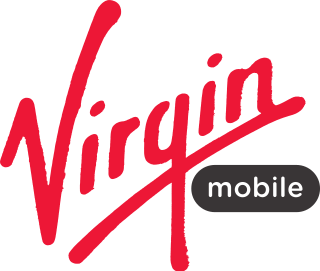
Virgin Mobile is a wireless communications brand used by seven independent brand-licensees worldwide. Virgin Mobile branded wireless communications services are available in the United Kingdom, Ireland, Canada, Colombia, Chile, Kuwait, Saudi Arabia, United Arab Emirates, Poland and Mexico. Virgin Mobile branded services used to be offered in Australia, France, Singapore, India, Qatar, South Africa and the United States.
Rogers Wireless Inc. is a Canadian wireless telephone company headquartered in Toronto, providing service nationally throughout Canada. It is a wholly owned subsidiary of Rogers Communications. The company had revenues of just under $15.1 billion in 2018. Rogers Wireless is the largest wireless carrier in Canada, with 13.7 million subscribers as of Q2 2023.

Fido Solutions Inc. is a Canadian mobile network operator owned by Rogers Communications. Since its acquisition by Rogers in 2004, it has operated as a Mobile virtual network operator (MVNO) using the Rogers Wireless network.

Virgin Mobile USA was a no-contract Mobile Virtual Network Operator. It used Sprint's network for coverage. It licensed the Virgin Mobile brand from United Kingdom-based Virgin Group. Virgin Mobile USA was headquartered in Kansas City, Missouri, and provided service to approximately 6 million customers.
Telus Mobility is a Canadian wireless network operator and a division of Telus Communications which sells wireless services in Canada on its numerous networks. It operates 5G, LTE and HSPA+ on its mainstream networks. Telus Mobility is the second-largest wireless carrier in Canada, with 10.6 million subscribers as of Q3 2020.

Virgin Plus is a Canadian provider of postpaid and prepaid wireless voice, text and data communications services throughout Canada. They also offer home Internet and TV services in select areas of Ontario and Quebec. Launched as Virgin Mobile Canada on March 1, 2005, as a joint venture between Virgin Group and BCE Inc., BCE took sole ownership on July 1, 2009, when it closed a deal to purchase the stake it did not already own. Virgin Plus calls its customers 'Members' and offers a Member Benefits program, which provides its customers with special offers, discounts, and VIP experiences.

Koodo Mobile is a Canadian mobile flanker brand started by Telus in 2008 and mostly oriented toward younger customers. Koodo differs from its parent Telus by not requiring a fixed term contract. Koodo currently provides postpaid, prepaid, and wireless home phone services. Being a subsidiary of Telus, Koodo has been able to offer extensive coverage and a strong presence in mobile retailers. This allowed Koodo to gain a presence nationwide.
LG Rumor is a series of feature phones from Sprint in the United States, manufactured by LG Electronics. Each phone is equipped with a slide-out Qwerty keyboard with the latest featured touchscreen.

Freedom Mobile Inc. is a Canadian wireless telecommunications provider owned by Quebecor. It has 6% market share of the Canadian wireless market, mostly in urban areas of Ontario, British Columbia and Alberta. Freedom Mobile is the fourth-largest wireless carrier in Canada, with 2,290,497 subscribers as of November 30, 2022.

Data and Audio-Visual Enterprises Wireless, d/b/a Mobilicity, was a Canadian mobile virtual network operator (MVNO) owned by Rogers Communications. Its name was a portmanteau of the words "mobility" and "simplicity". Mobilicity was one of several new mobile network operators, along with Public Mobile and Wind Mobile, which launched in Canada after a government initiative to encourage competition in the wireless sector. The carrier had over 250,000 Mobilicity subscriptions on May 16, 2013, the day in which Telus announced its failed attempt to acquire Mobilicity. The subscription count decreased to 157,000 by April 2015 according to court documents filed by Mobilicity's Chief Restructuring Officer in that month.

Public Mobile Inc. is a Canadian self-serve mobile brand which is owned by Telus. Launched on March 18, 2010, Public Mobile was one of several new Canadian cellphone providers that started in 2009–10 after a federal government initiative to encourage competition in the wireless sector.
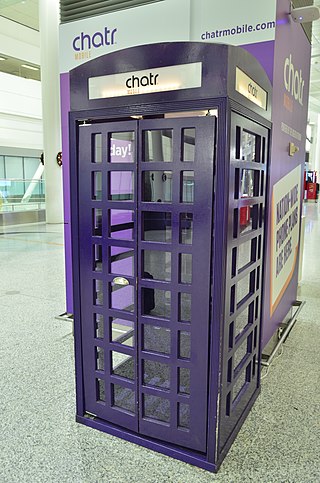
Chatr Mobile is a Canadian mobile virtual network operator owned by Rogers Communications Canada targeting entry-level customers. It is one of three wireless brands owned by Rogers Communications, including Rogers Wireless, and Fido Solutions. The provider launched its service in Toronto, Ottawa, Calgary, Edmonton, Vancouver, Quebec City, and Montreal under the name Chatr Wireless on July 28, 2010. The company re-branded to its current name in 2015.

The LG Optimus One is an entry-level series of touch-screen smartphones manufactured by LG Electronics, Inc. It was released running the Android 2.2 Froyo, and later LG released software to upgrade it to Android 2.3 Gingerbread. Although the basic physical form factor of each variant is the same, the variants have differences in hard button shape and layout, the form of the metal side bezel and the user interfaces added by LG or various carriers. Versions of the Optimus One exist that operate on various frequency bands and either GSM or CDMA-based network protocols. They may also feature one or more variations in hardware, such as a faster processor, the addition of a physical keyboard, a modem with higher theoretical speeds, or a better digital camera.
Clearnet was a division of Telus Mobility launched in April 2011 to sell landline and mobile phone bundles in Western Canada. It was a revival of the Clearnet Communications brand name, which originally belonged to an independent cellular provider that was merged into Telus Mobility in 2000. Telus relaunched Clearnet as a discount provider with a "limited market trial" in Kelowna, British Columbia and Red Deer, Alberta.
The Motorola Triumph is an Android powered smartphone available in the United States exclusively through Virgin Mobile USA. The device is similar to Huawei's U9000 Ideos X6 model sold internationally. The Triumph is the first Motorola-branded device sold by Virgin Mobile USA. Sprint Nextel and Motorola announced the Triumph at a joint press event held in New York City on June 9, 2011.
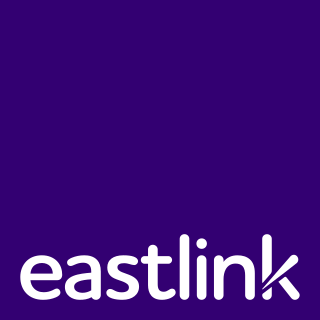
Eastlink Wireless is a Canadian mobile network operator owned by Eastlink. Its built network serves the provinces of Nova Scotia and Prince Edward Island, with additional coverage areas provided in New Brunswick, Ontario and Alberta communities as well as Newfoundland.
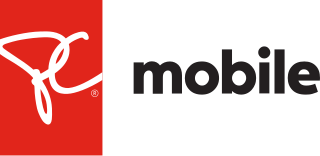
PC Mobile is a licensed white label prepaid wireless service operated in Canada. Its mobile telephone products and services operate on the network infrastructure operated by Bell Mobility and formerly Telus Mobility, but licensed the proprietary branding and payment media with the President's Choice supermarket store brand owned by Loblaws Inc. It also operates mobile phone kiosks in Loblaws banner stores under the name The Mobile Shop.

Lucky Mobile is a Canadian prepaid mobile virtual network operator and a subsidiary of Bell Canada. Founded in December 2017, Lucky Mobile operates on the Bell Mobility network alongside fellow subsidiary Virgin Plus. It targets the same market segment as discount mobile brands Chatr and Public Mobile.


